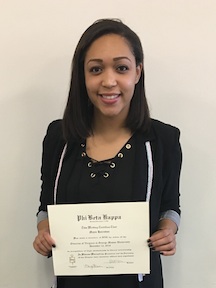By Austin P. Harrison
On Thursday, December 12, 2016, the Phi Beta Kappa Chapter at George Mason University held its winter induction ceremony and celebrated the accomplishments of the 28 students who, through hard work and dedication to excellence, have earned membership in this prestigious group.
The individuals fortunate enough to be invited to become members represent an extremely diverse cross section of the George Mason student body. ΦBK’s motto—“Love of learning is the guide of life.”—is ably represented by one among them, a young woman named Maya Hairston.
Hairston, who joined ΦBK in December at the end of her junior year, is majoring in conflict analysis and resolution and expects to complete her bachelor’s degree this fall. When not attending classes at George Mason, she calls Columbia, Maryland, home.
During her three short years at George Mason, Hairston has set herself apart from the pack. Aside from maintaining a 4.0 GPA, she also seeks less formal, but equally valuable, forms of education. Hairston is fluent in French, is involved in half a dozen other campus organizations, and during her time as an underclassman, she was a member of George Mason’s Division 1 Women’s Volleyball team.
Over the winter break, while most students were relaxing or trying to recharge from fall semester finals, Hairston embarked on a 15 day journey to South Africa, where she walked in the footsteps of her idol, the great Nelson Mandela. All of these things and more contribute to the thoroughly well-rounded students admitted into ΦBK, whose multifaceted education will prepare them to serve the greater community through their action and example.
INTERVIEW
In addition to your ΦBK membership, what other extracurricular activities (clubs, organizations, sports, hobbies, societies) are you involved in?
HAIRSTON: I am president of Honors College Black Ambition and a member of the Black Leadership Round Table, Mason Honor Committee, Golden Key Honor Society, and the Diversity Committee for the School of Conflict Analysis and Resolution. I am also a peer research mentor and a peer student success coach.
How did you first hear about ΦBK?
HAIRSTON: About two months before induction, I received a letter inviting me to register with Phi Beta Kappa online. The University reached out to me because of my excellent academic record and campus leadership. The dean of my college covered the registration fee. Gaining admission into this honor society is by invitation only to my understanding.
What does being a member of ΦBK mean to you?
HAIRSTON: It gives me great pleasure to know that this honor society was created as a secret, intellectual space for white men. I, an African-American woman, have managed to demonstrate a particular level of intellectual integrity that I am sure the founders would have never imagined. Being in the top 10 percent at this university was not without hard work and impeccable focus. I am truly blessed.
What are your career aspirations? Do you have a “dream job” in mind after graduation?
HAIRSTON: After graduation in the fall, I will be taking a semester off. In fall 2018, I should be attending law school in hopes of eventually become a defense lawyer for a non-profit organization geared towards exonerating wrongly accused prisoners.
How do you expect your liberal arts/science background to benefit you in the work world?
HAIRSTON: I have a passion for understanding the multiple perspectives that can author one story. My passion fuels my desire to be a lawyer who can effect change for individuals whose perspectives are not always fairly represented in a court of law. As a conflict analysis and resolution major in the honors college, my liberal arts training is different from most. As a multidisciplinary field, conflict resolution allows students to analyze practical problems and produce out-of-the-box solutions. As an honors student, my collegiate coursework is comprised of multiple disciplines, ranging from Chinese art to public policy. My exposure to a multi-disciplinary course load broadens my worldview and allows me to tackle problems from various angles that more traditional students may not consider. Much of this knowledge will contribute to the problem-solving, policy research, and interpersonal conversation that will occur as a criminal defense lawyer.
Read more about Hairston’s South African expedition at: https://mayahairstonblog.wordpress.com.
Austin P. Harrison is a junior at George Mason University majoring in environmental science with a concentration in conservation. George Mason is home to the Omicron of Virginia Chapter of Phi Beta Kappa.




